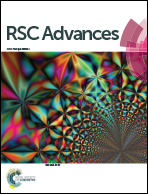Electrochemical assessment of phenol and triazoles derived from phenol (BPT) on API 5L X52 steel immersed in 1 M HCl†
Abstract
The corrosion inhibition of phenol triazoles was tested with several halogens by means of electrochemical impedance and potentiodynamic polarization. We observed the importance of the 1,2,3-triazole ring in the chemical structure because significant inhibition efficiencies (η) > 90% were achieved at low concentrations with the different halogens. These compounds have a physisorption-type adsorption process, in accordance with the Langmuir model. For long immersion times, the organic inhibitor BPTI showed good corrosion protection during 504 hours of immersion with η > 80%. Furthermore, the hydrodynamic conditions proved that organic molecules experience a desorption process related to the different rotation velocities employed. Finally, it was demonstrated by SEM that the corrosion velocity is diminished when using the BPTI inhibitor at 50 ppm.


 Please wait while we load your content...
Please wait while we load your content...